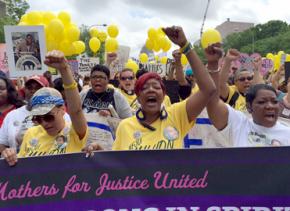Still searching for justice for our children
In an article published at Alternet, , a longtime leading member of the Campaign to End the Death Penalty and activist against the criminal injustice system, reports on a gathering of mothers who lost their sons to police brutality.
YEARS AGO, deep in the midst of the battle to stop executions in Maryland, we invited Sister Helen Prejean to speak at the fledgling chapter of the Campaign to End the Death Penalty at Johns Hopkins. We were running on fumes, having watched our friends Flint Gregory Hunt and Tyrone X Gilliam be executed by the state of Maryland. We were an exhausted mess. Sister Prejean immediately recognized the mood in the room. "I can tell many of you have been through the fire," she said.
Since that event, I've thought a lot about that fire; a fire that can burn and destroy, but also harden, purify and motivate. I've been out of the fire for some time now. Not since Maryland killed Steven Oken and Wesley Baker in 2005 have I felt its terrible heat, with all its danger and potential--until this past weekend.
This past Mother's Day Weekend, May 8-9, at least 39 women whose children were murdered at the hands of police officers or vigilantes came to Washington, D.C., from across the nation to demand justice. Led by Milwaukee's Maria Hamilton, founder of Mothers for Justice United, the group gathered to "take this fight directly to our elected officials." The weekend culminated on Saturday with nearly 300 supporters joining in solidarity with the moms to protest in front of the Department of Justice and present their demands to officials followed by a rally at a nearby park.

This was no stage-managed gathering or political window-dressing for aspiring politicians; instead, among these women were the living core of decades of resistance to police terror. They publically expressed their pain, sadness and outrage at continuing police violence across the nation.
Among them was Maryland's Dorothy Elliott, a veteran and hero to the movement against police killings. As we marched she told how emotional the weekend had been. Elliott's son was shot 14 times while seated, handcuffed, in the back of police cruiser in 1993. She shared how wonderful it felt to feel her "message was being heard."
Also present was Comfort Oludipe, whose son, Emmanual Okutuga, was killed by police in my hometown of Silver Spring, Maryland, in 2011. She described the hypocrisy of the police "who are supposed to protect, not be judge, jury, and executioner." Olupide was joined by Brenda Joyner, whose unarmed son, Trey Joyner, was shot by D.C. Park Police officers in 2009. "I'm still looking for justice for my son," Joyner said.
ONE WOMAN who seemed to represent the moment more than anyone was West Baltimore's Darlene Cain, who lost her son, Dale Graham, to Baltimore police in 2008. She seemed a combination of strength and understandable fatigue as she described how the weekend's actions were preceded by weeks of work supporting the struggle for Freddie Grey's family and community in Baltimore. She was not alone. As a visibly exhausted march organizer Maria Hamilton took the stage to thank fellow organizers at the close of Saturday's program, the crowd erupted in love for the woman who had helped make the gathering possible.
Pastor Traci Blackmon of Ferguson, Missouri also spoke. She told a story from the second Book of Samuel in which King David cut a deal with a rival group and delivered the seven sons of his predecessor to be executed. Pastor Blackmon recounted how the mother of these young men, Rizpah, unable to save her sons, took a blanket and sat down at the execution site and refused to move or let anything or anybody despoil the bodies for the entire harvest season, until at last King David was forced to recognize her, remove the bodies and bury them in honor.
After the close of the rally, I drove to another event in southeast Washington, where the family of Raphael Briscoe was holding a community BBQ and fundraiser for a new foundation set up to honor their son, murdered in 2011 at the hands of Washington, DC police. Raphael Briscoe's killing was caught on video as he ran, unarmed from police and was shot in the back. More outrageously, the video shows a district officer throwing a BB gun from a car, a gun they later claimed justified the shooting. No officers ever faced charges for the murder.
The fundraiser was organized at the very spot where Briscoe was cut down. After a handful of speakers, Briscoe's mother, Bridzette Lane, walked to the very spot where her son was shot and detailed what had happened to her son. "They killed him," she said, "for no reason."
It was at that moment that I understood words of Pastor Traci Blackmon. Bridzette Lane, Maria Hamilton, Dorothy Elliott, Comfort Oludipe, Brenda Joyner, and Darlene Cain were all doing what Rizpah had done centuries before: refusing to let the bodies of their children be removed or forgotten until justice has been done.
First published at Alternet.


